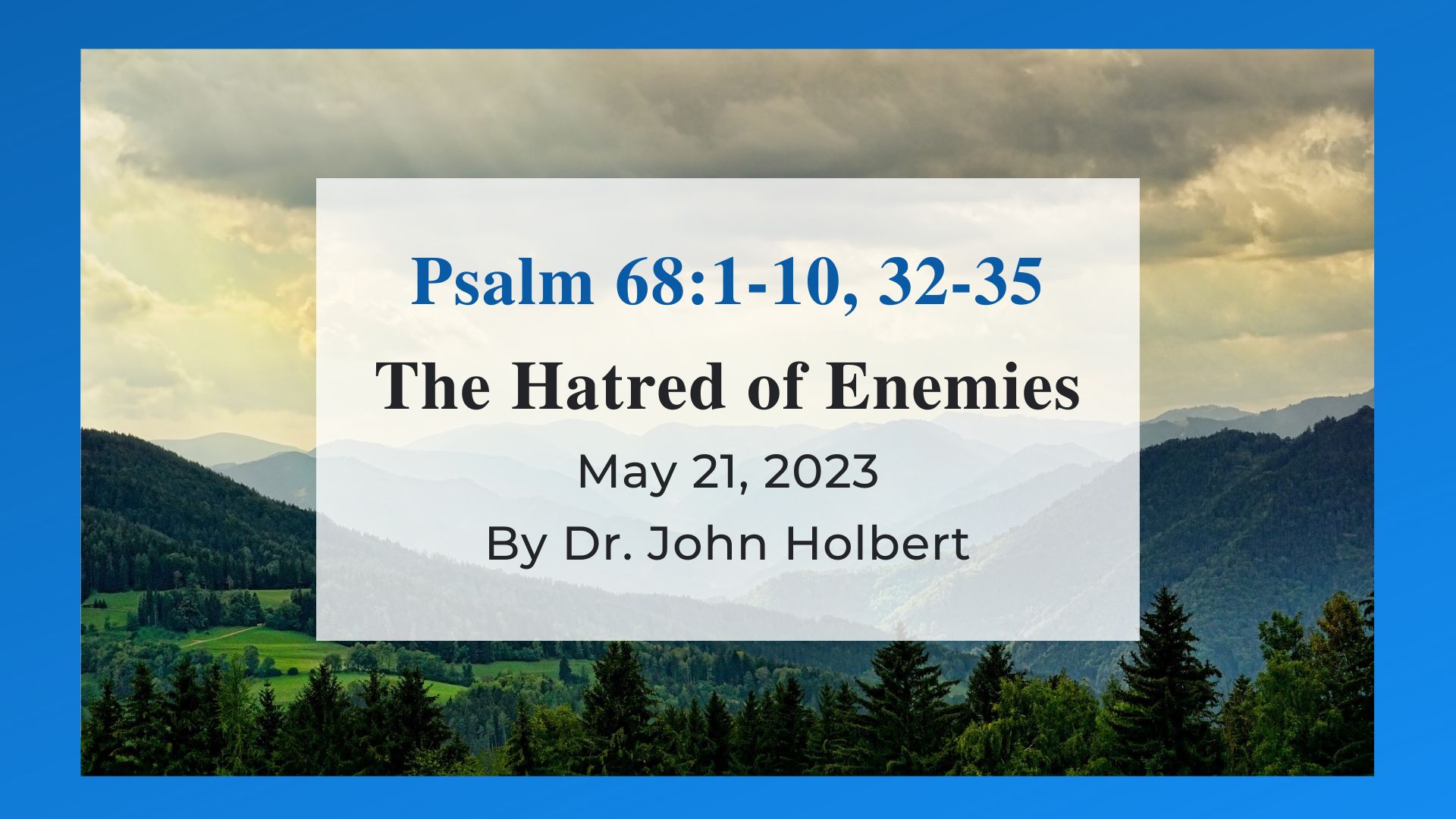The Hatred of Enemies - Reflections on Psalm 68:1-10, 32-35
by Dr. John Holbert on Tuesday, May 16, 2023

The Hatred of Enemies
Psalm 68:1-10, 32-35
The Peripatetic Hebrew Bible Preacher
Surely, one of Jesus’s most difficult demands is to “love your enemies, and pray for those who persecute you” (Mt.5:44). Many of us would be very glad if he had not said such a thing, or had not been remembered to have said it. There really cannot be anything more difficult than conjuring up love for enemies, or bowing one’s head in prayer for those who have spurned, rejected, or assaulted you. Far easier would it be if we could simply act on our genuine human emotions of fury and rage against those who have offended us. And, it must be said, many of us do precisely that on a regular basis. Capital punishment in many US states and numerous foreign countries remains a constant possibility, as a way of “getting even” with those outliers who dared to transgress our laws against murder and mayhem. Hang them, electrocute them, shoot them, poison them, so that they are stopped from their heinous acts forever. “Love your enemies,” says Jesus. Well, we say, easy for you to say, but you have not witnessed what we have, the death of a son or wife or friend or lover at the hands of a veritable beast, a barely-human person wielding a knife or gun or bomb.
You have heard it said, Matthew recounts just prior to Jesus’s hard demand, “Love your neighbor and hate your enemy.” It could well be that Matthew had Ps.68 in mind when he recorded that supposed past requirement. In reality, we have no direct scriptural passage that says exactly that, but we have any number of places that asks YHWH to destroy Israel’s enemies. Ps.68 is a prime example:
“But God will shatter the heads of the enemies,
the hairy crown of those who walk in their guilty ways.
YHWH said,
‘I will bring them back from Bashan,
I will bring them back from the depths of the sea,
so that you may bathe your feet in blood,
so that the tongues of your dogs may have their share from the foe.’”
(Ps.68:21-23). (You will note that the lectionary collectors chose not to include these lines in today’s reading!)
This is a truly gruesome and despicable prayer! If I understand it correctly, what the psalmist asks YHWH is to bring many already dead enemies back to life, from Bashan, scene of a huge defeat by Moses, and from the Sea of Reeds, in order that Israel may abuse them still further by “bathing their feet in their blood” (see also Ps.58:10 for a similar horrifying image), and by allowing “their dogs” equal access to that enemy blood. All that appalling action will be preceded by God’s own “shattering of their heads.” Good grief! Just what sort of God is portrayed in these grim lines?
The images of this poem appear to be quite ancient. Note the metaphors of smoke, fire, and wax in 68:2, along with the description of the God “who rides upon the clouds.” The former portraits remind us of the YHWH of Sinai, often depicted as enveloped in smoke and fire, and the latter recalls that ancient poem, Ps.18, where YHWH, like the primordial dragon of primitive Canaanite mythology, appears with “smoke arising from God’s nostrils, a devouring fire pouring from God’s mouth,” who comes swiftly “upon the wings of the wind” (Ps.18:8,10). This poem is steeped in the most venerable and primeval literature, much of which has been borrowed from the Canaanites who long preceded Israel in the land and who shared that land with them for many centuries.
Thus, the portrait of YHWH in Ps.68 is rooted in a time in Israel’s distant past when they struggled for survival in a hostile land, surrounded by people who were vastly superior to them in technologies and cultural stability. Without the power of YHWH to stand with them, nascent Israel was doomed to destruction and would have found themselves wiped from the pages of history before they found even a tiny foothold in the land that God had promised.
That perhaps explains why their language here is so brutal, so caustic against the enemies who threatened to obliterate them from their new-found place. Yet, it in no way excuses the obvious horror of the language, nor does it give modern readers and prayers any right to pray a prayer like this one in the 21st century. After all, we modern US Americans are not any longer the oppressed and terrified minority of the world; we now have the power that ancient Egypt and Babylon possessed, those empires that were easily capable of destroying Israel at any time. We cannot pray that Putin and Saddam Hussein and the 9/11 hijackers and Xi Liping, or anyone who we claim has aggrieved us, should have their heads shattered by God and their blood lapped up by our dogs. Such repulsive language cannot pass our lips at all, let alone in the act of prayer. It is nothing less than disgusting that an ancient Israelite poet wrote these words, but at least we now might at least partly understand why the poet did so. But there is no excuse for us. After the one we call Christ urged us to “pray for our enemies,” the prayer of Ps.68 has no place in our ongoing journey of faith.
